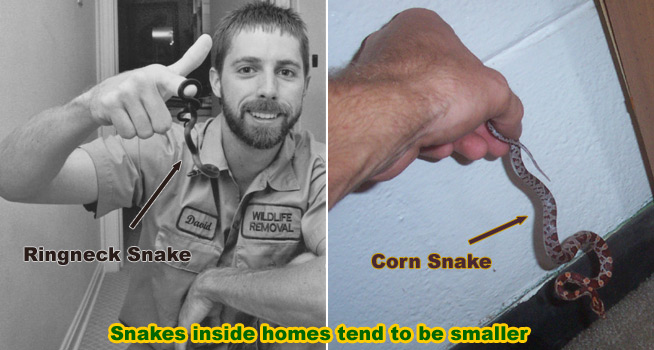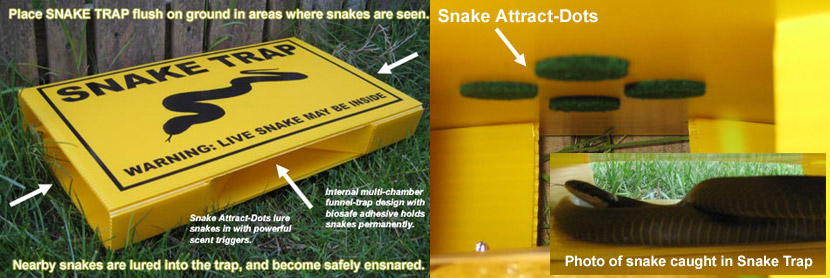
~ Most snakes inside houses tend to be smaller, because small
snakes can get into the house through very small gaps, even gaps
under the front door, or the sliding door in the back.
~ When I encounter a snake in the house, the first thing to do
is find it, if it's hiding. I then move very quickly to pick it
up, wearing gloves. You can even "smother" it in a towel and
take it outside. If it's venomous, I use snake tongs and
transport it in a snake bag.
~ The best way for a homeowner to remove a snake from a house is
to either call a pro like me (click the map at the bottom of
this page for a list of thousands of snake pros) or to buy a
snake trap, and set it in the house. Catch rates with the trap
are almost 100% inside.
~ Or, if the situation allows, if you see the snake and it's
slow enough, just grab a broom and sweep it out the door for
free!
~ If the snake is in a wall, that's hard. You'll most likely
have to wait for it to come out. Your best bet, in this case, is
a snake trap. Read about. Snakes
in the walls - how to find and remove them
~ After it's out, the most important thing to do is to find the
gaps or holes it used to slither in - no, it didn't come in with
the groceries - and seal those openings shut. Snakes can't dig
or chew, so you can just use caulk to seal the holes.
Few things are as creepy as walking downstairs in the middle of
the night for a glass of water, turning on your kitchen light,
and seeing a coiled, black snake under your kitchen table. If
you’re even less fortunate, you’ll get to see the snake slither
in front of you just as the light flicks on. For homeowners in
certain parts of the country, this is the reality of their
lifestyles. And it could be worse. In some countries, like
Brazil, it is standard protocol to beat your bed sheets with a
stick prior to climbing into bed. For those of us who aren’t
used to living that closely with nature, there are ways to
handle the occasional snake in the house.
Because a snake in the house has to be removed, it is important
to know what kind of snake you are dealing with. A poisonous
snake should not be handled, and the room the snake is in should
be completely closed off until help arrives. If possible to do
safely, a large bin can be tossed over the snake and then
weighted down. You should never attempt to get near a poisonous
snake needlessly. You may seriously underestimate the striking
distance of a venomous snake. The muscles in a serpent’s body
are very strong and can propel some animals as high as a
person’s head. If it is reasonable to close off that room of the
house, do so. Seal any openings beneath doors with rolled towels
or sheets, pressing them firmly against the door with weights on
the outside. Call a professional to come and remove the snake.
Non-venomous snakes are a little less intimidating, though they
can still strike and bite if they feel threatened. Assuming you
can see the snake, you will want to block off any areas the
reptile can slither into or under. Stoves, refrigerators,
couches, cabinets, and the like will make your snake removal job
a lot harder if you don’t block them off first. Using rolled
towels or sheets, stuff the gaps under your appliances and
furniture, moving as slowly as you can so you don’t startle the
snake. Once everything is blocked off, close off the room so the
snake cannot escape that way, either. Now, you can either shoo
the snake into a bin with a broom, or you can plop a large towel
or blanket over the snake and scoop it into a pillowcase. For
those less inclined to handle the serpent, the broom and bin
solution is best. If you are leery of even that solution, cover
the snake with your heavy duty bin and poke a few air holes in
the top. Call a professional and wait for them to arrive.
Ultimately, if you find a snake in your home and are not certain
if it is poisonous or not, always leave it alone. An injury is
not worth the risk to try to remove the snake yourself. Even
non-poisonous snake bites can cause serious injuries. Always err
on the side of caution. Standard methods of determining if a
snake is poisonous or not—such as head shape, color, or tail
rattling—should not be relied on. Too many serpents in the
animal world are exceptions to the rules of categorizing, and
it’s always better to be safe than sorry. If you do get bit by a
poisonous snake, you need immediate medical intervention. Some
poisons will numb and paralyze your limbs and some poisons will
eat away the flesh near the bite wound. All poisons are made to
kill, so don’t waste any time getting to the hospital. A non-
poisonous snake bite, though less likely to be fatal, can be
incredibly painful and will likely bleed profusely due to
anticoagulants in the snake’s saliva. Getting bit is no joke,
which is why a snake in the house should be left to the
professionals.
You basically have three options for getting rid of your
snake(s). First, you can call a professional wildlife expert
from my below directory. This person can catch and remove the
snake(s) and take other actions necessary to solve the snake
problem. Second, you can purchase a snake trap if you wish to
catch the snake yourself. Third, you can modify your land and
seal up your house to help keep snakes away and out of the
house. You can also read about How
to find and remove a snake in your attic.
Option 1 - HIRE A PROFESSIONAL
We can solve your snake problem for you. Our nationwide group of snake specialists services 95% of the US population. Click here to find your local snake removal expert in your town. Below are just some of our more popular areas:Option 2 - BUY A SNAKE TRAP
If a snake is indoors, a trap will work. I do not recommend using a glue-based trap outdoors, because it can inhumanely catch other small critters. I have reviewed and field tested several snake trap designs, and the one featured below is the most durable and effective. It is the highest quality snake trap available on the market. Read more about Snake Trap.
For more information, go to my Snake Removal - How to Get Rid of Snakes home page. For more information, go to my Snake Removal - How to Get Rid of Snakes home page. You can also visit Keep Snakes Out of Your House or Yard for more info on that subject.
Read more articles about snakes:
Where should I relocate a trapped snake?
How to get rid of snakes without killing them
What should I do if I find a nest of snakes?
Do snakes lay eggs or give live birth?
How To Remove A Snake In A Swimming Pool
How to remove a snake in a pond
Do snakes make good pets?
Are snakes dangerous to cats, dogs, or other pets?
Can snakes crawl up plumbing or toilets?
Plants that keep snakes away